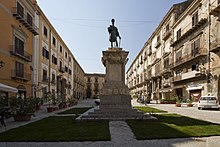
Sicily is the largest island in the Mediterranean Sea and one of the 20 regions of Italy. It is one of the five Italian autonomous regions and is officially referred to as Regione Siciliana. The region has 5 million inhabitants. Its capital city is Palermo.

Palermo is a city in southern Italy, the capital of both the autonomous region of Sicily and the Metropolitan City of Palermo, the city's surrounding metropolitan province. The city is noted for its history, culture, architecture and gastronomy, playing an important role throughout much of its existence; it is over 2,700 years old. Palermo is in the northwest of the island of Sicily, by the Gulf of Palermo in the Tyrrhenian Sea.

Ferdinand II was King of the Two Sicilies from 1830 until his death in 1859.

The Sicilian Vespers was a successful rebellion on the island of Sicily that broke out at Easter 1282 against the rule of the French-born king Charles I, who had ruled the Kingdom of Sicily since 1266. Within six weeks, approximately 13,000 French men and women were slain by the rebels, and the government of Charles lost control of the island. This began the War of the Sicilian Vespers.

Caltanissetta is a comune in the central interior of Sicily, Italy, and the capital of the Province of Caltanissetta. Its inhabitants are called Nisseni.

Pietro Consagra was an Italian sculptor. In 1947 he was among the founding members of the Forma 1 group of artists, who advocated both Marxism and structured abstraction.
Beati Paoli is the name of a secretive sect thought to have existed in medieval Sicily. The sect, as described by the author Luigi Natoli in his historic novel I Beati Paoli, resembles an order of knights fighting for the poor and the commoners. Whereas the novel is fictitious, Sicily's history bears some evidence that the Beati Paoli actually existed.

Francesco Camilliani was a Tuscan sculptor of the Renaissance period. He studied in Florence under Baccio Bandinelli. His son Camillo Camilliani was later a sculptor too, working in Palermo, where he also worked as an architect and held the post as well of ingegniere del Regno, "engineer to the Kingdom of Sicily".

The Cathedral of Monreale is a church in Monreale, Metropolitan City of Palermo, Sicily, southern Italy. One of the greatest existent examples of Norman architecture, it was begun in 1174 by William II of Sicily. In 1182 the church, dedicated to the Nativity of the Virgin Mary, was, by a bull of Pope Lucius III, elevated to the rank of a metropolitan cathedral. Since 2015 it is part of the Arab-Norman Palermo and the Cathedral Churches of Cefalù and Monreale UNESCO World Heritage site.
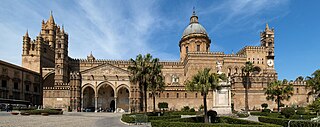
Palermo Cathedral is the cathedral church of the Roman Catholic Archdiocese of Palermo, located in Palermo, Sicily, southern Italy. It is dedicated to the Assumption of the Virgin Mary. As an architectural complex, it is characterized by the presence of different styles, due to a long history of additions, alterations and restorations, the last of which occurred in the 18th century.

Giacomo Serpotta was an Italian sculptor, active in a Rococo style and mainly working in stucco.
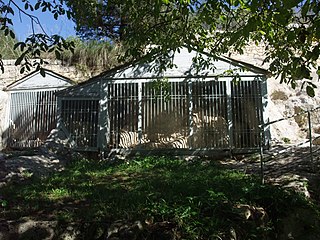
The Santoni are a collection of statues carved into a rock face near Palazzolo Acreide, the ancient Akrai, in Sicily.
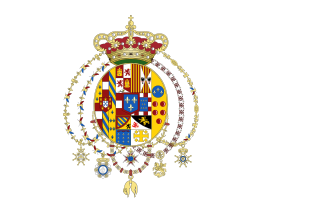
The Kingdom of the Two Sicilies was a kingdom in Southern Italy from 1816 to 1860. The kingdom was the largest sovereign state by population and size in Italy before Italian unification, comprising Sicily and all of the Italian Peninsula south of the Papal States, which covered most of the area of today's Mezzogiorno.

Forever Mery, is a 1989 Italian drama film directed by Marco Risi and released in 1989. It stars Michele Placido, Claudio Amendola, Alessandra Di Sanzo, Francesco Benigno, Roberto Mariano, Maurizio Prollo, Filippo Genzardi, Alfredo Li Bassi, Salvatore Termini, Luigi Maria Burruano, Gianluca Favilla, Giovanni Alamia and Tony Sperandeo.

Maria Cristina of Naples and Sicily was a Princess of Naples and Sicily and later Queen of Sardinia as wife of King Charles Felix.
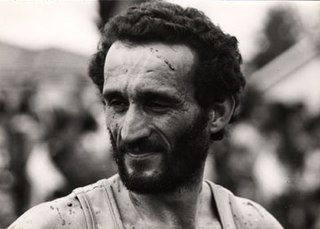
Luigi Zarcone was an Italian middle and long distance runner.

The Praetorian Fountain is a monumental fountain located in Piazza Pretoria in the historic center of Palermo, region of Sicily, Italy. The fountain dominates the piazza on the west flank of the church of Santa Caterina, and is one block south of the intersection of the Quattro Canti. The fountain was originally built in 1544 in Florence by Francesco Camilliani, but was sold, transferred, and reassembled in Palermo in 1574.
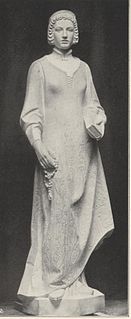
Margaret of Sicily or Margherita di Sicilia-Aragona was a Sicilian princess, daughter of the King Frederick III of Sicily and his wife Eleanor of Anjou. In 1348 she married Rudolf II, Count Palatine of the Rhine, and was Countess Palatine of the Rhine until 1353, year of the husband's death.
San Biagio is a Roman Catholic church located on via Francesco Randazzo #24 in the town of Nicosia, in the province of Enna, region of Sicily, Italy.
The Chiesa del Carmine is a Roman Catholic church located on via Giuseppe Li Volsi in the town of Nicosia, in the province of Enna, region of Sicily, Italy. It rises next the former Convent of the Santissima Annunziata, also called the convent of the Maria Vergine del Monte Carmelo.
